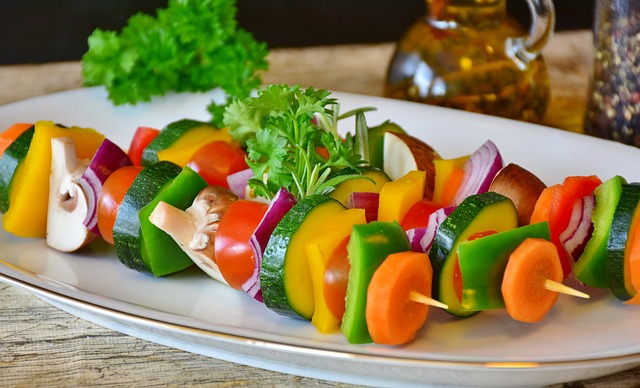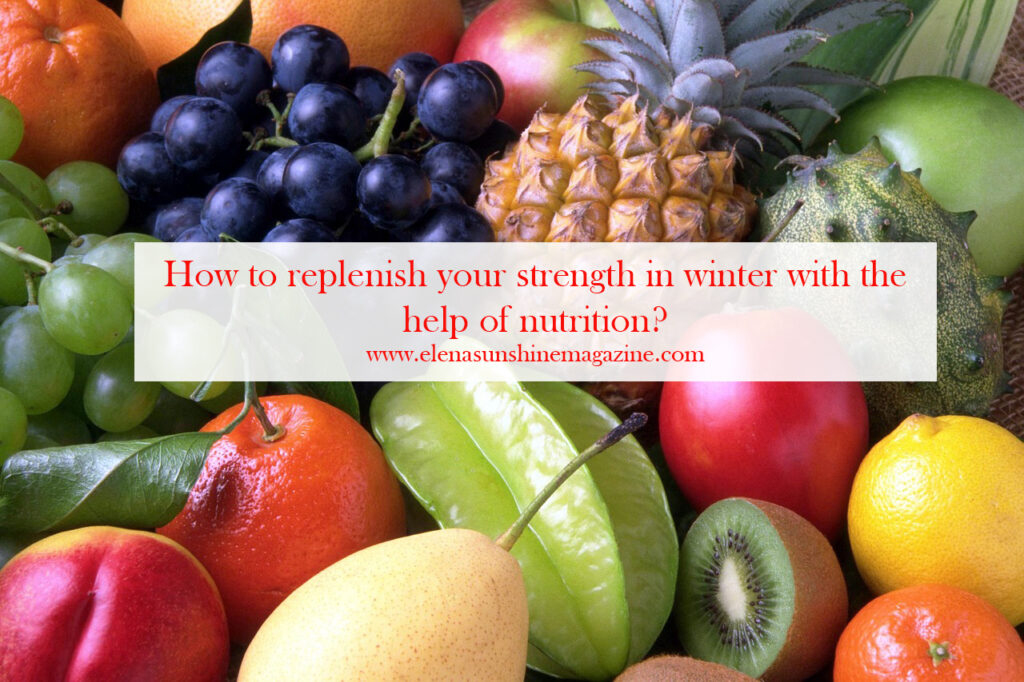To overcome the winter period in the most comfortable condition, we recommend that you do not forget about taking care of yourself. You can start with the most straightforward steps. For example, be a little more attention to what we eat. How to replenish your strength in winter with the help of nutrition?
In winter, we need food that will give the body strength and vigor, without the formation of excess fat on the sides. Of course, it should be delicious and easy to prepare, so that you don’t have to spend a lot of time at the stove. And also not boring.
And for this it is not necessary to buy exotic products, it is enough to diversify dishes with spices or marinade.
The reduction of daylight hours and low temperatures affect the protective functions of the body.
Choose seasonal foods to get the most vitamins and avoid colds.
Do not overeat, remove snacks, especially carbohydrate ones.
Cook at home, use gentle heat treatment of products: stewing, baking, solving, steaming.
Don’t forget about fermented foods – a natural source of probiotic cultures for our microbiome. They are also important for increasing antibodies and strengthening the immune system.
It is healthy to drink bone broth and cook food based on it. This hot and very nutritious dish is rich in collagen, saturated with minerals and amino acids, and easily digested.
Onion and garlic are rich in phytoncides that fight microbes. Don’t be afraid to add these foods to your diet.
Some people believe that you need to drink very little water in winter. Despite the fact that we sweat less, a lot of moisture is still lost. Cold air dries the skin in the same way as hot air in summer. Water is necessary for normal digestion, the work of the circulatory system. In addition to pure water, it is useful to drink restorative herbal teas.

What the body needs in winter
Today we will not dwell in detail on the reasons for the lack of trace elements (ecology, method of growing vegetables, etc.). In winter, the body especially needs support. Vitamins and trace elements can provide it:
#1. Vitamin D — will help to cope with seasonal apathy and fatigue. The factor regulates the level of calcium and phosphorus in the body. Due to free calcium in the blood, muscle contraction occurs, hormone production is triggered, and impulses are formed in nerve cells. Thus, vitamin D has an effect not only on our skeleton but also on the brain.
#2. Vitamin A — supports the protective functions of the immune system, and is also necessary for the health of the eyes and skin.
Symptoms of vitamin A deficiency (manifest, not immediately): dry skin, frequent and long colds, difficulties with night vision, visual disturbances, brittle hair and nails, and acne.
#3. Vitamin E is known as a powerful natural antioxidant. It helps to cope with increased mental stress. Vitamin improves the supply of oxygen to cells and protects them from free radicals.
#4. Omega-3 is an essential set of polyunsaturated acids. They are the building material for cells and are actively involved in metabolism. The complex also has a positive effect on the work of the brain. One of the components of omega-3, docosahexaenoic acid, accelerates signal transmission between neurons.
We remember information better, stay attentive longer and keep concentration. Regular intake of omega-3 complex reduces the manifestation of age-related cognitive impairment. Without acids, the body cannot assimilate fat-soluble vitamins. And all the elements listed above are included in this group.
#5. Vitamin B group — performs several functions at once: increases efficiency stabilizes the emotional background and helps to cope with seasonal depression.
It is necessary to make up for the lack of vitamin B12 and folic acid at the same time. These 2 substances help each other to assimilate. To do this, include more green vegetables in your diet, especially leafy ones, which do not need to be subjected to long heat treatment.
After all, folic acid is rapidly destroyed by heat and light. Green salads of all varieties, spinach, broccoli, greens, string beans, and asparagus are perfect.

Important: sufficient acidity of gastric juice is necessary for the absorption of vitamin B12. Therefore, if you take medications that reduce the acidity of the stomach, then you are at risk. To ensure the best absorption of vitamin B12, you can use simple steps:
Add lemon juice to your food;
season the dish with wine vinegar;
the longer you cook (steam, fry) meat, the better;
add bitter plants and herbs (dandelion, arugula) to your food;
do not forget about pineapple and papaya – they contain a lot of digestive enzymes.
Symptoms of shortage: fatigue, hair loss, brittle nails, anemia,
impaired sensitivity in the hands and feet
#6. Vitamin C — not only strengthens the immune system, but also protects the heart, and also keeps the skin young.
The main sources of vitamin C in food: are rosehip (berries), cilantro, parsley, dill, citrus, fruits, bell pepper (especially red), black currant,
and all kinds of cabbage. And also – these are chili peppers, kiwi, strawberries, tomato juice, spinach, potatoes, blueberries, onion, and garlic.
Symptoms of vitamin C deficiency:
Early symptom: fatigue.
Later symptoms: poor or slow wound healing, hair loss, dental problems, swelling, and joint pain.
What should be added to the diet? How to replenish your strength in winter with the help of nutrition?
You can begin to make up for the lack of trace elements with the help of nutrition. We advise you to include these products in the menu:
Fatty fish (salmon, salmon, herring, mackerel, anchovies, tuna) — will act as a source of vitamin D and fatty acids.
Mackerel contains a lot of Omega-3 fatty acids and vitamin D. It replenishes B12, thanks to which the cells are actively saturated with oxygen
Seafood is rich in zinc, which is essential for skin and muscle health, immunity, and fertility. They contain tryptophan, a precursor of serotonin, from which melatonin is synthesized.
Spinach — will make up for the lack of vitamins B and A.
Coriander, mint, cinnamon, various types of peppers, ginger, and saffron are suitable for winter.
Eggs — saturate the body with almost all the deficient elements.
Cod liver is one of the record holders in vitamin D content.
Carrots are a constant source of vitamin A.
Beetroot is also an excellent supplier of vitamin A.
Nuts and seeds are notable for their high content of vitamin E and fatty acids. They are rich in vitamins E, K, and group B, as well as trace elements, especially manganese. The protein of pine nuts is characterized by an increased content of deficient amino acids: lysine, methionine, and tryptophan.

Carrots are a constant source of vitamin A.
Beetroot is also an excellent supplier of vitamin A.
Cabbage — will provide vitamins A and B.
Broccoli will saturate you with an impressive list of B vitamins and vitamin E. Cauliflower, a source of protein, vitamins C, group B, PP, A, and sulforaphane. To preserve the maximum benefit, use the most gentle methods of its preparation.
Potato. During heat treatment (cooking or baking), the starch contained in potatoes changes its structure. After complete cooling, it becomes “stable”, gaining the ability to reach the large intestine. “Stable” starch performs the function of a prebiotic – it nourishes the beneficial bacteria of the microbiome, providing them with a favorable environment for existence.
Beef liver — will satisfy the need for all the missing trace elements.
Beef tongue – is a source of animal cholesterol, which is so necessary for the construction of sex hormones. Contains a large amount of vitamin B12. An indispensable product in the diet of children.
Mutton – the diet of these animals mainly consists of grass and root vegetables. Their meat is an excellent source of protein and healthy fats.
Vegetable oils — will satisfy the need for vitamin E.
Ghee contains a large amount of vitamins A and E, and unsaturated fatty acids, among which there is linoleic acid, which affects the proper formation and growth of cells. There is no oxidized cholesterol in this oil. After processing, there are practically no traces of casein and lactose left in it.
How to rebuild the menu. How to replenish your strength in winter with the help of nutrition?
Try to fit the products organically into the diet. In the morning, make porridge with nuts or flax seeds, be sure to take some kernels with you for a snack, order a Coleslaw salad for lunch as a snack, and in the evening, instead of meat, cook fish with broccoli. This way you will not only provide the body with the necessary recharging but also spend less time on evening cooking.
We recommend giving up mayonnaise dressings in favor of vegetable oils and at least sometimes replacing heavy and hearty side dishes with lightweight options. Carrot puree will turn out to be no less delicious than potato. Also, as a side dish, you can cook spinach, stewing it a little with a mixture of butter and vegetable oils.
However, it is not always possible to fill the deficit with nutrition. We do not know exactly how many vitamins have entered the body. In addition, not all of these products may be to your taste.
In a tense situation, we make mistakes in nutrition: we snack instead of a full lunch, eat stressful sweets or have a fast food dinner. However, during this period, the body, more than ever, needs vitamin support. Provide him with the necessary trace elements, and a surge of strength will not keep you waiting!

How to get energy from food? How to replenish your strength in winter with the help of nutrition?
Do you often have a feeling of drowsiness and apathy after breakfast or a heavy lunch?
What to do to stay energetic:
#1. Drink as much as you want, do not look at standards and norms.
#2. There is something that has been cooked for a couple of hours!
#3. Eat as little heat-treated food as possible, train the intestines, and let it work!
#4. To carry out training and morning yoga on an empty stomach, to get new skills and knowledge as much as possible in the morning hours. In the evening, get more small pleasures (dried fruits and nuts or reading books).
#5. Choose plant foods.
#6. Intervals in meals! They should be, the body is so arranged that it is easier to digest food if the intestines and stomach are as empty as possible.
#7. Listen to yourself. If after 2.5 hours you still have abdominal discomfort, then this is not your food. It is worth watching how you digest certain foods.
There are so many delicious and healthy things in the world that nature has given us!



